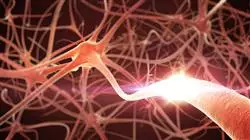University certificate
The world's largest faculty of medicine”
Introduction to the Program
The primary care pediatrician is a highly responsive specialist who solves more than 90% of the health demands of pediatric patients and their families. Their training is crucial in providing quality health care, and they must constantly update their knowledge in order to perform a quality praxis"

This Postgraduate certificate in Pediatric Endocrinology is designed to review the concepts and procedures for the main glandular pathologies in children and adolescents, in order to establish the correct diagnosis and treatment, based on scientific evidence and the experience of recognized professionals in the field of Pediatrics.
It includes the main endocrinological pathologies, such as strabismus, red eye, palpebral and lacrimal pathology or the management of ocular tumors in children. The contents are approached with emphasis on the latest advances, so that professionals can update their knowledge and procedures, in order to provide quality care and improve the prognosis of pediatric patients.
This Postgraduate certificate will also be useful for those pediatricians who wish to update their knowledge and review action protocols, since it allows the specialist to know first hand the most important advances in their usual clinical practice in primary care, keeping up to date with the new developments that appear every day in the discipline.
This Postgraduate certificate in Pediatric Ophthalmology will broaden your professional capacity to deal with growth problems in children"
This Postgraduate certificate in Pediatric Ophthalmology contains the most complete and up-to-date scientific program on the market. The most important features of the program include:
- Clinical cases presented by experts in the different specialties. The graphic, schematic, and eminently practical contents with which they are created provide scientific and practical information on the disciplines that are essential for professional practice
- Diagnostic and therapeutic novelties and clinical practice guidelines on ophthalmologic pathologies in children
- Presentation of practical workshops on procedures, diagnosis, and treatment techniques
- Algorithm-based interactive learning system for decision-making in the presented clinical situations
- All of this will be complemented by theoretical lessons, questions to the expert, debate forums on controversial topics, and individual reflection assignments
- Content that is accessible from any fixed or portable device with an Internet connection
This Postgraduate certificate may be the best investment you can make in the selection of a refresher program for two reasons: in addition to updating your knowledge in Pediatric Ophthalmology, you will obtain a Postgraduate certificate degree from TECH Global University"
Its teaching staff includes health professionals belonging to the field of pediatrics, who contribute their work experience to this training, in addition to other specialists belonging to leading scientific societies.
The multimedia content developed with the latest educational technology will provide the professional with situated and contextual learning, i.e., a simulated environment that will provide immersive training program to train in real situations.
This program is designed around Problem Based Learning, whereby the physician must try to solve the different professional practice situations that arise during the Postgraduate certificate. This will be done with the help of an innovative interactive video system developed by renowned pediatric experts with extensive teaching experience.
This online methodology allows you, through clinical cases, to practice in a simulated environment and improve your performance skills"

Don't miss the opportunity to update your knowledge in ophthalmologic pathologies to increase the quality of your care for pediatric patients and their families"
Why study at TECH?
TECH is the world’s largest online university. With an impressive catalog of more than 14,000 university programs available in 11 languages, it is positioned as a leader in employability, with a 99% job placement rate. In addition, it relies on an enormous faculty of more than 6,000 professors of the highest international renown.

Study at the world's largest online university and guarantee your professional success. The future starts at TECH”
The world’s best online university according to FORBES
The prestigious Forbes magazine, specialized in business and finance, has highlighted TECH as “the world's best online university” This is what they have recently stated in an article in their digital edition in which they echo the success story of this institution, “thanks to the academic offer it provides, the selection of its teaching staff, and an innovative learning method aimed at educating the professionals of the future”
A revolutionary study method, a cutting-edge faculty and a practical focus: the key to TECH's success.
The most complete study plans on the university scene
TECH offers the most complete study plans on the university scene, with syllabuses that cover fundamental concepts and, at the same time, the main scientific advances in their specific scientific areas. In addition, these programs are continuously being updated to guarantee students the academic vanguard and the most in-demand professional skills. In this way, the university's qualifications provide its graduates with a significant advantage to propel their careers to success.
TECH offers the most comprehensive and intensive study plans on the current university scene.
A world-class teaching staff
TECH's teaching staff is made up of more than 6,000 professors with the highest international recognition. Professors, researchers and top executives of multinational companies, including Isaiah Covington, performance coach of the Boston Celtics; Magda Romanska, principal investigator at Harvard MetaLAB; Ignacio Wistumba, chairman of the department of translational molecular pathology at MD Anderson Cancer Center; and D.W. Pine, creative director of TIME magazine, among others.
Internationally renowned experts, specialized in different branches of Health, Technology, Communication and Business, form part of the TECH faculty.
A unique learning method
TECH is the first university to use Relearning in all its programs. It is the best online learning methodology, accredited with international teaching quality certifications, provided by prestigious educational agencies. In addition, this disruptive educational model is complemented with the “Case Method”, thereby setting up a unique online teaching strategy. Innovative teaching resources are also implemented, including detailed videos, infographics and interactive summaries.
TECH combines Relearning and the Case Method in all its university programs to guarantee excellent theoretical and practical learning, studying whenever and wherever you want.
The world's largest online university
TECH is the world’s largest online university. We are the largest educational institution, with the best and widest online educational catalog, one hundred percent online and covering the vast majority of areas of knowledge. We offer a large selection of our own degrees and accredited online undergraduate and postgraduate degrees. In total, more than 14,000 university degrees, in eleven different languages, make us the largest educational largest in the world.
TECH has the world's most extensive catalog of academic and official programs, available in more than 11 languages.
Google Premier Partner
The American technology giant has awarded TECH the Google Google Premier Partner badge. This award, which is only available to 3% of the world's companies, highlights the efficient, flexible and tailored experience that this university provides to students. The recognition as a Google Premier Partner not only accredits the maximum rigor, performance and investment in TECH's digital infrastructures, but also places this university as one of the world's leading technology companies.
Google has positioned TECH in the top 3% of the world's most important technology companies by awarding it its Google Premier Partner badge.
The official online university of the NBA
TECH is the official online university of the NBA. Thanks to our agreement with the biggest league in basketball, we offer our students exclusive university programs, as well as a wide variety of educational resources focused on the business of the league and other areas of the sports industry. Each program is made up of a uniquely designed syllabus and features exceptional guest hosts: professionals with a distinguished sports background who will offer their expertise on the most relevant topics.
TECH has been selected by the NBA, the world's top basketball league, as its official online university.
The top-rated university by its students
Students have positioned TECH as the world's top-rated university on the main review websites, with a highest rating of 4.9 out of 5, obtained from more than 1,000 reviews. These results consolidate TECH as the benchmark university institution at an international level, reflecting the excellence and positive impact of its educational model.” reflecting the excellence and positive impact of its educational model.”
TECH is the world’s top-rated university by its students.
Leaders in employability
TECH has managed to become the leading university in employability. 99% of its students obtain jobs in the academic field they have studied, within one year of completing any of the university's programs. A similar number achieve immediate career enhancement. All this thanks to a study methodology that bases its effectiveness on the acquisition of practical skills, which are absolutely necessary for professional development.
99% of TECH graduates find a job within a year of completing their studies.
Postgraduate Certificate in Psychiatric Neurology and Sleep Disorders
The severity and cause of neuropsychiatric disorders can vary in pediatric patients, which can affect their mood, emotions and overall brain activity. This causes great distress to families, as children may experience irritability, sadness and even depression. It is essential to approach these pathologies in a comprehensive manner, taking into account the latest scientific evidence available, which obliges physicians to update their knowledge in this field to ensure the well-being of their patients. This update can be achieved in a solvent way through the Postgraduate Certificate in Psychiatric Neurology and Sleep Disorders.
Learn 100% online and 24 hours a day.
Delve into the latest advances in the diagnosis and treatment of diseases such as Attention Deficit Hyperactivity Disorder and sleep disorders in pediatric patients through the Postgraduate Certificate in Psychiatric Neurology and Sleep Disorders. In addition, you will study through a wide range of interactive resources, designed by the best experts in the field. Do not miss the opportunity to grow as a professional and enroll!







